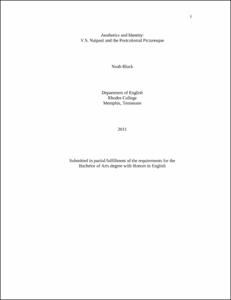Please use this identifier to cite or link to this item:
http://hdl.handle.net/10267/9706Full metadata record
| DC Field | Value | Language |
|---|---|---|
| dc.contributor.author | Black, Noah | - |
| dc.date.accessioned | 2011-06-13T17:28:49Z | - |
| dc.date.available | 2011-06-13T17:28:49Z | - |
| dc.date.issued | 2011-05 | - |
| dc.identifier.uri | http://hdl.handle.net/10267/9706 | - |
| dc.description | Noah Black granted permission for the digitization of this paper. It was submitted by CD. | en_US |
| dc.description.abstract | In three of his major texts, V. S. Naipaul explores the existential exile of his protagonists, who engage with their landscapes and natural surroundings in order to construct new postcolonial identities. Naipaul’s characters often aestheticize these landscapes in language that recalls the eighteenth-century philosophies of the sublime, the beautiful, and the picturesque. Through encounters with various landscapes both in England and its former colonies, Naipaul’s exiled subjects cultivate their postcolonial selves, which are, as Homi Bhabha would argue, inevitably hybrid, that is, the synthesis of two conflicted cultural identities that results in the formation of a third, transcendent identity. This project analyzes these encounters through instances of what I call the “postcolonial picturesque,” an aesthetic that allows us to explore the landscape’s identity-forming potential. I chart how the development of the postcolonial picturesque in The Mimic Men (1967), A Bend in the River (1979), and The Enigma of Arrival (1987) reflects the evolution of postcolonial hybridity in Naipaul’s work. Initially, in The Mimic Men, the characters’ debilitating obsessions thwart the realization of a transcendent hybridity. Then, in A Bend in the River, the postcolonial picturesque slips into sublimity and terror, as the chaos of postcolonial revolution overwhelms it. Finally, The Enigma of Arrival redeems this aesthetic by grasping its cultural utility and achieving at last a truly hybrid postcolonial identity. | en_US |
| dc.description.sponsorship | This paper was approved by Dr. Jason Richards, Dr. Michael Leslie, Dr. Lynn Zastoupil, and Dr. Marshall Boswell. | en_US |
| dc.publisher | Memphis, Tenn. : Rhodes College | en_US |
| dc.rights | Rhodes College owns the rights to the archival digital objects in this collection. Objects are made available for educational use only and may not be used for any non-educational or commercial purpose. Approved educational uses include private research and scholarship, teaching, and student projects. For additional information please contact archives@rhodes.edu. Fees may apply. | - |
| dc.subject | Text | - |
| dc.subject | English, Department of | en_US |
| dc.subject | Honors papers | en_US |
| dc.subject | Student research | en_US |
| dc.title | Aesthetics and Identity: V.S. Naipaul and the Postcolonial Picturesque | en_US |
| dc.type | Thesis | en_US |
| Appears in Collections: | Honors Papers | |
Files in This Item:
| File | Description | Size | Format | |
|---|---|---|---|---|
| Black_Noah_Honors_2011.pdf | 526.34 kB | Adobe PDF |  View/Open |
Items in DSpace are protected by copyright, with all rights reserved, unless otherwise indicated.